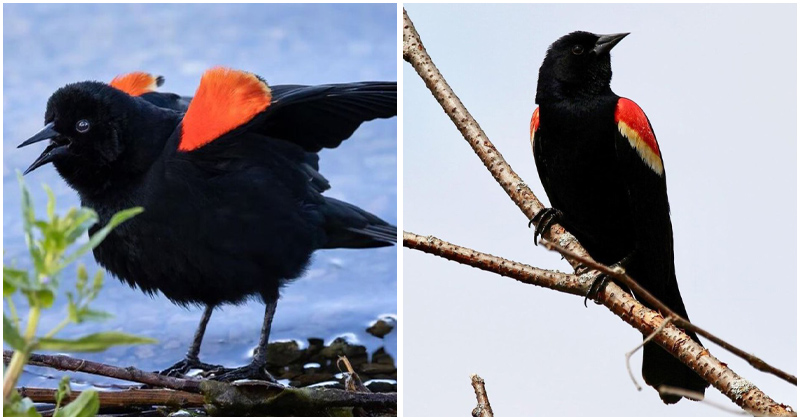Sometimes some creatures are too widely spread that we forget they are endangered ones that also need humans’ protection, and the red-winged blackbird is sadly one of them. This species is said to be the most popular land bird in North America and it is far from being rare. But once again, its life is in danger and this stunning birdy needs more attention to be less affected by habitat destruction and urbanization.

This passerine bird is a member of the family Icteridae that is mostly seen in North and Central America. As its name suggests, the red-winged blackbird (also known as the Agelaius phoeniceus) can be recognized easily thanks to the distinctive red epaulets with pale yellow borders on the male’s wings, which stand out brilliantly on its glossy black coat.

The female, however, is less prominent even though they share the same name. It is covered in dark brown plumage and has a brighter chest as well as white eyebrows.

Like many other birds, the red-winged blackbird female is also smaller than the male. A medium female weighs only about 41.5 g, while a male bird weighs about 64 g. Their chicks often resemble the mother.

Although these birds love to live in the North, they also migrate to the South when winter comes, typically in September and October. Meanwhile, the red-winged blackbirds living in Western and Central America often remain in place.

According to some studies, the red-winged blackbird prefers wetland habitat over upland habitat.

This species is omnivorous. Its favorite food is plant materials like fruits and seeds, but this agile birdy also feeds on insects and other small animals when it needs tons of energy, especially during the breeding season.
Just take a look at this gorgeous creature:
The females are the ones in charge of building the nests and incubating the eggs, they do everything without the help of the males. It often takes them 3 to 6 days to make a nest and 11 to 12 days to incubate 3 to 5 eggs until they finally hatch.

These hatchlings would be ready to leave the nest after 11 to 14 days, pretty fast compared to many other animal babies.

Male red-winged blackbirds are really aggressive when it comes to protecting their territory, they can even attack larger birds. They are strong animals that face the loss of natural habitats quite bravely, but they are still listed as Threatened on the IUCN Red List as this once-abundant species has declined 99% since the 60s of the last century.
H/T: One Big Birdcage

